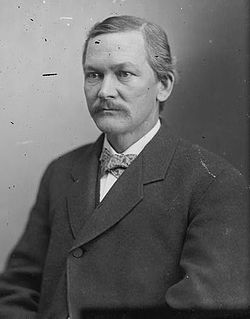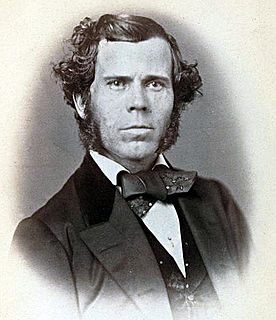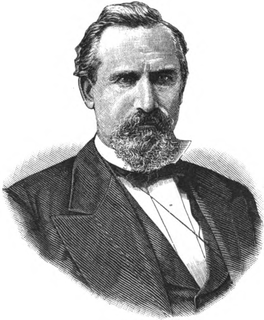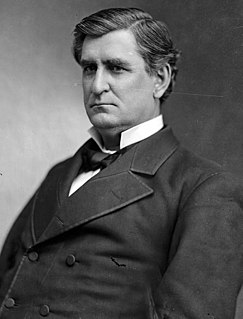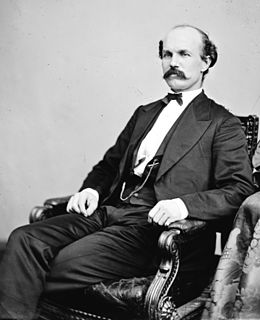This article includes a list of references, related reading or external links, but its sources remain unclear because it lacks inline citations .(March 2013) (Learn how and when to remove this template message) |
| Thompson W. McNeely | |
|---|---|
 | |
| Member of the U.S.HouseofRepresentatives from Illinois's 9th district | |
| In office March 4, 1869 –March 3, 1873 | |
| Preceded by | Lewis W. Ross |
| Succeeded by | Granville Barrere |
| Personal details | |
| Born | Thompson Ware McNeely October 5, 1835 Jacksonville, Illinois |
| Died | July 23, 1921 (aged 85) Petersburg, Illinois |
| Political party | Democratic |
| Alma mater | University of Louisville |
| Occupation | Attorney |
Thompson Ware McNeely (October 5, 1835 – July 23, 1921) was a U.S. Representative from Illinois.

The United States House of Representatives is the lower chamber of the United States Congress, the Senate being the upper chamber. Together they comprise the legislature of the United States.

Illinois is a state in the Midwestern region of the United States. It has the 5th largest Gross Domestic Product by state, is the 6th-most populous U.S. state and 25th-largest state in terms of land area. Illinois is often noted as a microcosm of the entire United States. With Chicago in the northeast, small industrial cities and great agricultural productivity in northern and central Illinois, and natural resources such as coal, timber, and petroleum in the south, Illinois has a diverse economic base, and is a major transportation hub. Chicagoland, Chicago's metropolitan area, contains over 65% of the state's population. The Port of Chicago connects the state to other global ports around the world from the Great Lakes, via the Saint Lawrence Seaway, to the Atlantic Ocean; as well as the Great Lakes to the Mississippi River, via the Illinois Waterway on the Illinois River. The Mississippi River, the Ohio River, and the Wabash River form parts of the boundaries of Illinois. For decades, Chicago's O'Hare International Airport has been ranked as one of the world's busiest airports. Illinois has long had a reputation as a bellwether both in social and cultural terms and, through the 1980s, in politics.
Born in Jacksonville, Illinois, Mcneely attended the public schools and Jubilee College in Peoria, Illinois. He graduated from Lombard College in Galesburg, Illinois in 1856 and from the law department of the University of Louisville in Louisville, Kentucky in 1857. He was admitted to the bar in 1857 and commenced practice in Petersburg, Illinois. He served as member of the Illinois constitutional convention in 1862.

Jacksonville is a city in Morgan County, Illinois, United States. The population was 19,446 at the 2010 census. It is the county seat of Morgan County. It is home to Illinois College, MacMurray College, Illinois School for the Deaf, and the Illinois School for the Visually Impaired.

Jubilee College State Park is an Illinois state park located 6 miles west of Peoria, Illinois. It contains Jubilee College State Historic Site, a frontier Illinois college active from 1840 to 1862.

Peoria is the county seat of Peoria County, Illinois, and the largest city on the Illinois River. Established in 1691 by the French explorer Henri de Tonti, Peoria is the oldest European settlement in Illinois, and is named after the Peoria tribe. As of the 2010 census, the city was the seventh-most populated in Illinois, with a population of 115,007. The Peoria Metropolitan Statistical Area had a population of 373,590 in 2011. Until 2018, Peoria was the global and national headquarters for Caterpillar Inc., one of the 30 companies composing the Dow Jones Industrial Average, and listed on the Fortune 100; in the latter year, the company relocated its headquarters to Deerfield, Illinois.
McNeely was elected as a Democrat to the Forty-first and Forty-second Congresses (March 4, 1869 – March 3, 1873) from Illinois's 9th congressional district. He did not seek renomination in 1872. He served as delegate to the Democratic National Conventions in 1872, 1892, and 1896. He resumed the practice of law in Petersburg, Illinois. He served as master in chancery for Menard County from 1910 until his death in Petersburg, Illinois, July 23, 1921. He was interred in Rosehill Cemetery.

The Democratic Party is one of the two major contemporary political parties in the United States, along with the Republican Party. Tracing its heritage back to Thomas Jefferson and James Madison's Democratic-Republican Party, the modern-day Democratic Party was founded around 1828 by supporters of Andrew Jackson, making it the world's oldest active political party. The Democrats' dominant worldview was once social conservatism and economic liberalism while populism was its leading characteristic in the rural South. In 1912, Theodore Roosevelt ran as a third-party candidate in the Progressive Party, beginning a switch of political platforms between the Democratic and Republican Party over the coming decades, and leading to Woodrow Wilson being elected as the first fiscally progressive Democrat. Since Franklin D. Roosevelt and his New Deal coalition in the 1930s, the Democratic Party has also promoted a social liberal platform, supporting social justice.

The Forty-first United States Congress was a meeting of the legislative branch of the United States federal government, consisting of the United States Senate and the United States House of Representatives. It met in Washington, D.C. from March 4, 1869, to March 4, 1871, during the first two years of Ulysses S. Grant's presidency. The apportionment of seats in the House of Representatives was based on the Eighth Census of the United States in 1860. Both chambers had a Republican majority.

The Forty-second United States Congress was a meeting of the legislative branch of the United States federal government, consisting of the United States Senate and the United States House of Representatives. It met in Washington, D.C. from March 4, 1871, to March 4, 1873, during the third and fourth years of Ulysses S. Grant's presidency. The apportionment of seats in the House of Representatives was based on the Eighth Census of the United States in 1860. Both chambers had a Republican majority.








